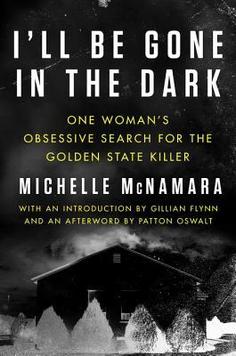 This week I mainly painted (my living room… I’m no Van Gogh or anything), binge-watched HGTV shows where things were going far worse in their major renovations than in my little paint-splotched corner of the world, and devoured I’ll Be Gone in the Dark: One Woman’s Obsessive Search for the Golden State Killer by Michelle McNamara. Even though the subject of this book is right in my wheelhouse (example: in between episodes of Property Brothers, I did occasionally peek at the ID channel to see whether I’d already seen this particular installment of American Monsters), somehow I hadn’t heard of Michelle McNamara, a writer and creator of the blog True Crime Diary, and I might never have seen her work if I hadn’t heard the news of her untimely death a few years ago, in her sleep, at age 46. This is my loss, and it is a tremendous one. I’ll Be Gone in the Dark is really a hybrid, a combination of notes, essays and interviews compiled by McNamara, interspersed with some autobiographical content that explains, in part, her obsession with the Golden State Killer. This was McNamara’s name for the serial rapist, killer and prowler who stalked various communities up and down the state (Sacramento, Stockton, Modesto, Contra Costa county, Goleta, Irvine, and others). Other names for this perpetrator include the East Area Rapist and the Original Night Stalker (not to be confused with the other Nightstalker). I don’t think this is much of a spoiler: I’ll Be Gone in the Dark doesn’t solve the case, nor does it narrow a vast and aging amount of evidence to a few specific names. What it does is detail the crimes—the path of terror this man wreaked on victims and their families. He is the unnamed shadow haunting every page of the story, elusive and shape-shifting, his crimes only linked years after the fact when law enforcement agencies began sharing information and the CODIS database became an essential crime-solving tool. Also, it brings to life the woman behind the scenes: a woman who was haunted by an unsolved case from her childhood, and whose obsession with cold cases brought her to the GSK. In I’ll Be Gone in the Dark, she interviews cold case detectives, tours neighborhoods and crime scenes, gathers a startling amount of evidence, and narrows in on certain theories. After her unexpected death, some of her crime-solving friends stepped in to look through the mountains of files and bring closure to her part of the story. Recommended for: Anyone who can name upwards of five serial killers without the aid of Google, anyone who watches the ID Channel despite somewhat cheesy reenactments, anyone who has ever been obsessed with an unsolved mystery, anyone who worries about her own obsessions. In short: Anyone like me.
0 Comments
Square footage of living/dining room: I never actually measured, but once I started painting, it kept getting larger.
Days: 3 Hours: 25 Audiobooks listened to: 2 (Nomadland by Jessica Bruder and The September Society by Charles Finch) Shows on HGTV watched for inspiration: at least one but possibly four or five (the plotline was roughly the same) Times I changed my mind about the paint color: 3 Times the roller pad got stuck on the roller and I chucked the whole thing in the trash: 1 Trips to Home Depot: 6 Times I got the grumpy/judgy paint cashier at Home Depot: 2 Times I cursed myself for starting the project: 7 Times I considered putting the house on the market “as is”: 2 Times adorable beagle leaned up against wet paint: 1 Times said beagle blocked passageway while I was carrying a loaded paint roller: 132 Times I moved the ladder and it clunked and the somewhat highstrung rat terrier thought the house was under attack: 284 Times I put the dogs outside and they immediately barked to be let back in: 87 Times I went up and down the ladder: a million? Conservative estimate, based on groaning of my knee. Steps recorded on Fitbit for walking back and forth in my living room on Saturday: 13,000 Times I went through the drive-thru of Taco Bell with paint on my nose and didn’t realize it until later: 1 Times I got paint on my shoe and couldn’t get it off and just colored over it with a black Sharpie: 2 Times I said “this is my last time painting this room”: many But hey! It’s done now. Except for one little thing I still need to touch up... *numbers are approximate 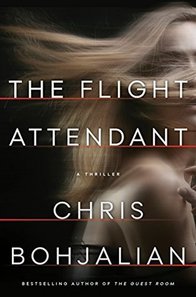 The Flight Attendant by Chris Bohjalian Confession: I remember loving Midwives, but that was in 1997 which was (gulp) more than twenty years ago. In the meantime, I’ve acquired some of Bohjalian’s other books, but somehow haven’t managed to crack the covers. The Flight Attendant has officially changed that for me. So—wow. What a book. In the opening scene (so not a spoiler), Cassandra wakes up in a hotel room in Dubai next to the man she slept with the night before. This is a pattern she has repeated in cities all over the world, in various stages of alcoholic stupor—except this time, the man next to her has been brutally murdered. The Flight Attendant is my favorite kind of thriller, with multiple threads and plenty of things I didn’t see coming, as well as a morally compromised and unapologetic narrator. This kind of narrator has been done before, sure; but where the narrator in Girl on the Train was somewhat grating, Cassandra hits the right wrong notes, if that makes any sense—she’s not looking for pity from anyone, and she owns her sometimes appalling decisions, even when as a reader you might feel she’s on some kind of suicide mission. This one kept me turning pages and left me completely satisfied. 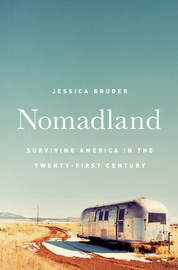 Nomadland: Surviving America in the Twenty-First Century by Jessica Bruder Warning: This book will probably make you hate Amazon. Also warning: You should probably go check on your 401k, and while you’re at it, vote to make sure no one snatches your Social Security from under your feet. This book is an in-depth look at the America’s nomads—particularly, people in their 60s to 80s who have been forced out of jobs, priced out of the housing market, and have taken to the open road in search of seasonal work and a quiet place to park the camper for the night. I’d read Bruder’s feature “The End of Retirement” in Harper’s a few years back, and approached this one eagerly. (Although note: I’m listening to the audio book, and the narrator isn’t my favorite. Read the book if you can.) Bruder gives an insider’s look at this nomadic community as she follows them from campsites to jobs to campsites, eventually acquiring her own live-in van. There is some of the romance that comes with being on the road (think: Steinbeck’s Travels with Charley), but also some of its despair (also Steinbeck: The Grapes of Wrath), as well as a look at where these people came from and how they’re making the nomadic life work. Many of these people who are old enough to be grandparents end up doing hard seasonal labor at Amazon warehouses. Amazon calls it Camperforce: a program that “brings together a community of enthusiastic RV’ers who help make the holidays bright for customers of Amazon.com” – from the Amazon Camperforce website. The work is both repetitive and grueling, requiring long shifts on concrete and resulting in numerous repetitive-motion injuries for about $11/hour. Retired people (or people of that age, anyway) make better employees, the thinking goes—they understand hard work, and they’ll get the job done—in part thanks to Amazon’s vending machines that dispense (free!) painkillers. So those Prime boxes that appear on your doorstep like clockwork during the holiday rush? They were most likely packed by people who literally cannot afford rent and have no economic safety net, and are working in somewhat brutal conditions at an age they should be able to put their feet up. Although I admire what Bruder is doing here, and the book has given me numerous insights, there are times when it feels like she is glamorizing the experience, or glossing over some of its more miserable aspects. This may be due to her focus on the relentlessly upbeat Linda May, who can take just about anything in stride (as I suppose you would have to, when your house can spring a leak at any time on the road). Still, the darker issues about the struggles facing the middle and lower classes when unemployment hits and housing becomes a luxury are things I wanted to see explored more in depth here. And did I mention that my spring break has officially started? It’ll be mostly audiobooks for me as I’m trying to paint my living room from top to bottom.
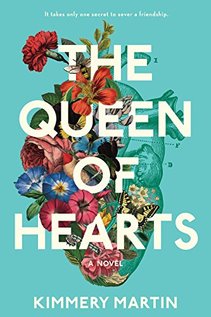 The Queen of Hearts – Kimmery Martin (February 2018) Okay. Let’s just get this one out there: I watched the first six or seven seasons of ER like I was eating candy (with abandon) and fulfilling a religious obligation (with intense purpose) at the same time. Although I have only a small idea what these things mean, I can bark “pulse ox” and “CBC” and “V-fib” and “stat” like it’s no one’s business. This is a language I share with my husband, also an ER fanatic from the mid- to late-90s era. No joke: he once passed a nursing practice test based on his knowledge of ER terminology alone. The best scenes in The Queen of Hearts, in my opinion, were the ones that brought me into the heart of the trauma, with the life or death decisions in the hands of medical students and their harried instructors. Absolutely gripping. This was also a friendship drama—two female doctors with established careers coming to terms with an event from their med school pasts. I liked the past drama and the present drama… although I wasn’t sure I bought the book’s conclusion. (Zadie as a character is a much more forgiving person than Paula as a human, TBH.) I’d be curious to hear what you think! 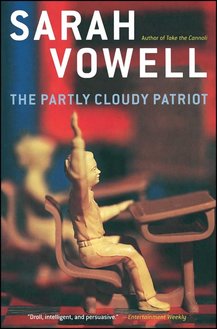 The Partly Cloudy Patriot - Sarah Vowell (2003) I like Sarah Vowell, and she was a natural choice for my #yearofnonfiction, having devoured her work on NPR and having loved Assassination Vacation and having a physical copy of Lafayette and the Somewhat United States on my bookshelf, courtesy of a friend who once had Sarah as a student. I know what you’re thinking: two degrees of separation from Sarah Vowell? Paula lives a charmed life. I listened to the audiobook, which Vowell narrates, and which also contains musical introductions by They Might Be Giants, and features a variety of guest narrators (including people no one has never heard of, like Conan O’Brien and Stephen Colbert) in bit roles. The Partly Cloudy Patriot is part-road trip, part-history lesson, part-social commentary, part-personal quirks of the author—I know. That’s a lot of parts. Here I should mention that I’m a bad reader of collections (essays, short stories, etc.) since one of two things inevitably happens: I end up not seeing the forest for the trees, or I realize halfway through that I can only identify with a single tree in the entire forest. Some of the essays here seem only loosely connected thematically (“Tom Cruise Makes Me Nervous” and “Wonder Twins”), but overall there’s a thread of fascination with history and the (mythology of the) Founding Fathers that’s pretty interesting. “Canada Haunts Me”—about the differences between American and Canadian viewpoints of the world—had me laughing out loud. There was a fascinating essay on the 2000 presidential debates held at Concord High School, with an explanation of an Al Gore “Love Canal” misquote that was heard around the world. And as someone whose childhood was filled with stops at brown historical markers all along I-80, I could relate to her visit to the Underground Lunchroom at Carlsbad Caverns, the battle fields of Gettysburg, the Salem of witch trial fame, and, just to prove a point—North Dakota. Gotta say… I’m liking all this non-fiction. What are you reading? Special thanks to BookClubbish, which posted this essay on their website. 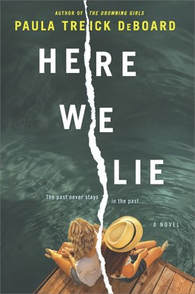 In the opening scene of my novel Here We Lie, a woman stands behind a podium, addressing a crowd of reporters. She takes a shaky breath and tells the story of a horrific assault that happened fourteen years earlier, at the hands of a man now running for US Senate. Stop me if you’ve heard this one before. This scene was a regular occurrence in 2017— yeah, I’m looking at you, Moore, and Franken and Franks and Conyers and Fahrenhold, not to mention the disgraced men from movie and recording studios and news anchor desks. And there’s no reason to suspect that 2018 won’t bring fresh horrors, as the #MeToo movement gains momentum, and more people come forward, liberating themselves from decades-long shame and fear. Advance reviews of Here We Lie have talked about its timeliness, its pertinence to a world that, ready or not, is finally listening to the stories of women. As one reviewer on Goodreads asked, “Ms. DeBoard, do you have a crystal ball?” But if you have any insight into the publishing world, you probably know that the finished (copyedited, proofread, etc.) manuscript was in the hands of my editor at Park Row Books in February 2017, and the bulk of the story was written during the summer of 2016. Maybe the world was listing in this direction as more and more of us said, “This is simply not okay.” But at the time I was digging into the narrative, I didn’t see what was on the horizon. *** In 2016, when I was watching news clips about the election with an interest bordering on obsession, I wasn’t thinking of my latest work in progress as a book about sexual assault, although that’s certainly an aspect of Here We Lie that resonates now. I was more focused on female friendships, in the ways that women treat women, and the broader perception of what it means to be a woman in the public arena. Yet real life—and a world where everyone was suddenly taking political sides—began encroaching on art. The more I wrote, the more it seemed that certain things were begging to be said, things I wasn’t even sure I wanted to say. Like anyone else, I hold political opinions, but I typically think of my fiction writing as an escape from current realities, rather than a dive into the deep end. But the outside world, with all its noise, was simply unavoidable. In my once-a-month writing group, we all had the same lament, regardless of political persuasion: It’s hard to create right now. It was hard not to let the world, a giant ball of tension, bump up against our creative instincts. In the midst of imminent election craziness, a person I’d known for my entire adult life posted something on Facebook calling Hillary Clinton the c-word. Now, I hadn’t expected this person to be a Clinton supporter, mind you, but the level of vitriol was beyond rational—it was frightening. Clinton had dared to be a female with political aspirations in a public place, and for this she was attacked in crude terms that related to her own femininity. Suddenly, these kinds of slurs were everywhere, it seemed—in the comments sections, of course, but also, increasingly, in everyday life. One Saturday morning, as I rushed through the Walmart parking lot with a shopping list in hand, a man used the same epithet toward me in a profanity-laced rage. For not complying with his request for money, I was insulted. My own femininity was a weapon that could be used against me. Around this time, in the revision phase with a deadline looming, I had been writing and rewriting one particular scene in Here We Lie. Megan and Lauren, the book’s main characters, are riding their bikes back to their college campus when a truck with three men pulls up beside them—the same men whose advances they have turned down earlier. I kept edging toward and pulling back from the vulnerability of these young women on the side of the road, with no witnesses in sight, the same way I might watch a Law & Order: SVU episode—wanting the story, not wanting the story. The scene was fictional, but it kept bringing back moments from my own life, and therefore moments I assume are universal, too—moments where you feel particularly defenseless and exposed, where you suddenly realize that things can go very, very badly, through no fault of your own. *** Here We Lie isn’t my story; I’ve survived the casual, offhanded sort of misogyny that is linked with being a woman—things that shame and sting and quietly become part of the people that we are. But I found myself more and more wanting to write this particular story, to go to that dark place, to think about the challenges a woman might face when coming forward to publicly name an attacker. I’m not sure when I made the decision to set the story during a senate campaign, and to make one of the characters a man of immense political power. But it’s fair to say that with the noise of the 2016 election season in the background, maybe I couldn’t separate my art from life. There’s a particular kind of power that comes with government—also, with movie moguls and entertainers—that makes them seem untouchable and beyond reproach. Like Goldman Sachs--too big to fail. The #MeToo movement was everywhere, the hashtag popping up on my Facebook feed, mentioned in my students’ writing samples. Though I knew those stories were out there, this time, the issue wasn’t going away. This time, powerful men were proving they weren’t too big to fail. Looking back, #MeToo feels inevitable, like trying to keep a lid on a boiling pot. Enough was finally enough. *** In November, when Roy Moore’s accusers came forward, friends who had read advanced copies of Here We Lie began to reach out to me. Can you believe what’s in the news? and For a second there, I thought I was reading your book. “I know,” I said, sick to my stomach in the way of déjà vu experiences and dreams where I felt trapped, feet too slow and cumbersome to move the body out of danger. ARCs of my novel had been shipped, and reviews were beginning to come in, and I sat in front of the television, paralyzed. I ached for the women as they told their stories, and then again as they faced skepticism and criticism. Over and over, it seemed, otherwise compassionate, decent people (including yes, women) asked: But why would they wait so long to come forward? I submit one possible answer with my character in Here We Lie, but even though I was describing a fictional situation, that answer was still complex. Megan faces the shame of being a victim, the fear of not being believed in a world stacked in favor of her attacker, the misplaced self-doubt (did I somehow bring this on myself?), the loss of confidence and purpose. Every assault must result in some variation of these feelings, with the added complications of time, place, and people, not to mention the factors that can’t be fathomed peeking from the outside in. From that outside vantage point, it seems there are always two choices: come forward or stay silent. From the comfortable position of “not me too,” it seems simple enough. But when I was writing these scenes for Megan, I knew it wasn’t an easy choice. And for far too many real women, there is no choice at all. In Here We Lie, the women are complicated—not virginal or perfect, not the sort of victim we seem to demand in headlines, to propel our collective righteous sense of anger. It’s easy to use 1950s standards of decorum against the women of today--Look at that tight skirt. Why did she go to the party in the first place?—and for some reason more difficult to place the blame properly. Maybe we want an easy answer—a solution that seems within our grasp. But if women would only dress more modestly, or be careful not to put themselves into certain situations… if we didn’t have a drink and we kept away from traditionally male fields… if we didn’t smile so much (or smiled more), if we didn’t walk down the street alone… The temptation has been there, for generations, to blame the victims and shame the accusers, because we haven’t wanted to go to that other dark place. What causes some men to attack and violate women, strangers or acquaintances, subordinates or even spouses? How have we as a society allowed this, and now that we are staring it head-on, how can we affect real change? Despite Here We Lie being set in the world of political players, I wasn’t intending to make a political statement. I’m sure there will be readers who encounter Here We Lie down the road, who believe that I was referencing a specific senator or trying to push an agenda. That’s probably inevitable, and in some ways, natural—doesn’t all of life right now seem to circle back to political views? But I’m hoping instead it can start a few discussions, and maybe elicit a bit of empathy. The characters in Here We Lie are the product of my own imagination, but far too many women—those who have come forward, and those who haven’t—live with this reality every day. As I wrote in the afterward of the novel, this story is part of a much larger issue, and I’m humbled to submit one small piece. A couple of years ago, I decided that I’m basically pretty stupid. (For many of you, the only surprise here will be that it took me so long to come to this realization.) I’m a great lover of history, for example, but there are some serious gaps in my knowledge, and I seem to be reaching the age where a lot of the things I learned a long time ago have been… well, forgotten. Am I smarter than a fifth grader? I hope so, but fifth graders have been exposed to certain facts more recently than I have. So, this fiction lover set a goal: Half of what I read in 2018 will be non-fiction. (GULP. This has already been a challenge!) Enter The Hemingses of Monticello: An American Family by Annette Gordon-Reed. This book has been on by TBR list for ages (National Book Award winner, Pulitzer Prize winner…), and thanks to my SIL Heather, it was part of my Christmas haul. I’ve always been interested in the other side of history, the one that doesn’t make our textbooks. Winston Churchill: “History is always told by the victors.” (Also… by the important people. Who coincidentally were male.) This is the meticulously researched story of the Hemingses, a slave family intimately connected with the Jeffersons—and by intimately, yes, I do mean that Sally Hemings, Jefferson’s wife’s African American slave half-sister was in fact the mother of a number of his children. What strikes me here, at about 60% through this 800-pager, is how much Annette Gordon-Reed has pieced together about the Hemingses, and yet ultimately how little we know about them. Sally Hemings is the shadow behind each of these passages, unseen and unheard in the larger narrative of Jefferson the statesman, the president, the national hero. I started this book with gusto in January, then had to back off for a few weeks, because—is this strange? I may have lost perspective—I found myself so emotionally attached and invested in Sally, in this girl (seventeen to Jefferson’s forty-seven, at this point in the story) who doesn’t even appear for entire chapters, that I had to step away. I’ve read quite a lot of fiction on the topic of slavery, sure, and seen some movies, but Gordon-Reed’s research has brought it to life for me in way that feels uncomfortable and therefore very necessary. 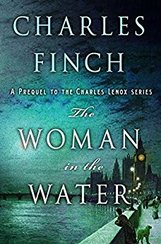 Thanks, Louise Penny—now I have another author’s name to recommend to my mom. And ten more books to buy. And also, I’m reading: The Woman in the Water by Charles Finch (February 2018), which is .5 in the Charles Lennox series. I always feel like the cool kid when I’m reading a book that is just out, but the truth is that I have Louise Penny’s recommendation to thank—I follow her FB page—and in a happy coincidence, the book was available in my library’s audio selection. Also, it turns out there are already ten books in the series, and I’m obviously not as sharp as I thought I was. It’s a good, old-fashioned whodoneit detective story, with our hero Charles Lennox (an unlikely detective, since his background makes him a shoo-in for a seat in parliament), his valet Graham who has quite a knack for crime-solving himself, and an endearing cast of secondary characters. If you’re new to this series, like me (… and let’s pause for a moment, to say that I’m really not good at reading a series, because THE COMMITMENT. There are ten other books in this series, and at this rate it will take me a few years to read them all IN ORDER, because I simply must read things in order…), it evokes everything I love about detective stories and true sleuthing, especially at a time period when the profession was new and forensic science was a long way in the future. Thanks, Louise Penny—now I have another author’s name to recommend to my mom. And ten more books to buy. I’ve started and stopped a lot of things. Hello, baby sweater out of the softest purple yarn. Hello, manuscripts abandoned after fifty pages. Hello, any TV series with more than five seasons (… but not you, Criminal Minds. I would never). But I could probably count on one hand the number of books I’ve started and abandoned, and even there, extenuating circumstances come into play. Once a book had to be returned to the library half-read, and by the time it was available again, I’d moved on to other books, other stories. And when I was a teenager, there was a pulpy novel in the McDonald’s break room where I worked, and I read it in fifteen minute increments all summer long, only to find out that the last twenty or so pages were missing when I got to that point. I’m not just a reader, I’m a finisher. (You may now pin me with a special badge. Thank you.) Here’s some of the latest: The Michigan Murders by Edward Keyes, which I listened to on audiobook, my phone in my pocket, the volume turned all the way up, while I putzed around the backyard. The first 75% of this book I recommend without hesitation—even though I learned afterwards that Keyes had taken the somewhat bizarre step of changing the names of everyone involved, including the killer. Being obsessed with true crime, or fictional crimes that read like real crimes, I had to then read everything Google could tell me (which was really not quite enough). Anyway—this one fell into lap, so to speak. I was on Hoopla scanning audiobooks and accidentally clicked on it. I call serendipity. Anyone have any true crime books to recommend? 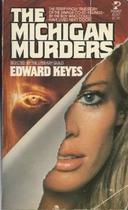 That cover, though. Ouch. Far From the Tree by Robin Benway. Technically young adult, a genre that of course didn’t exist when I was a young adult, this book was amazing in about fifteen different ways. I love it when someone can write teenagers well—without relying on stereotypes or well-worn tropes. I’m typically not someone who cries when I read, either, maybe because I don’t gravitate toward those kinds of stories—but I bawled reading this one. When a writer can make me feel for characters as if they are real people, and leave me feeling relieved that they’re going to be okay on their own, after the last page, that’s top-notch right there. Also I met Robin Benway at an event in SoCal and she was lovely and unassuming and oh yeah, right after that she won the National Book Award for Young People’s Literature. I’m calling that my brush with royalty. What are you reading?
|
Paula Treick DeBoardJust me. Archives
December 2023
Categories |
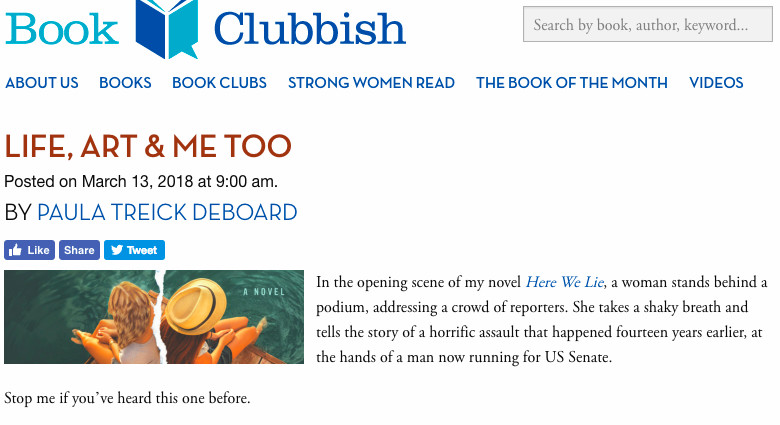
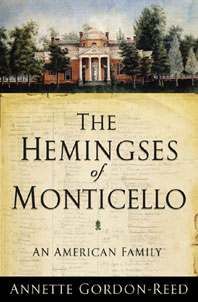
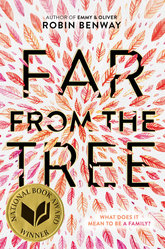
 RSS Feed
RSS Feed